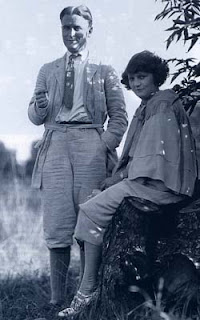Earlier this week, Colleen and I went to see "The Curious Case of Benjamin Button", the extraordinary movie based on a short story by F. Scott Fitzgerald. I loved it. Colleen not s'much. (I was sitting there choked in tears at the end of the three hour film, so I only vaguely remember her saying something about "watching paint dry.") I want to see it again, so I'm trying to get the Gare Bear to go with me this weekend, but I won't be surprised if he reacts the same way Colleen did.
The movie is long. And odd. It requires patience and a complete suspension of disbelief that modern audiences simply aren't trained for, so you've got to be in the right mood for it. The same is true of the short story, though the story and script have very little in common -- at least superficially.
 The story is very Fitzgerald (though it's not an example of his best writing, IMHO), and the setting -- Baltimore during the industrial revolution, Spanish American War, roaring twenties -- is far removed from the movie, which is set in New Orleans between WWI and Hurricane Katrina. That shift in time and geography has a major impact on the characters, of course. The story is sort of absurdist or maybe Kafkaesque. It's very short and wry and walks us briskly through the pragmatic challenges of Benjamin's backwards life while the movie takes time to be sentimental, philosophical, and rich with beautifully wrought images. The women in the story are a lot less noble than the movie women, typical of Fitz, and made me newly sad for him and Zelda, two people who loved and tortured each other famously.
The story is very Fitzgerald (though it's not an example of his best writing, IMHO), and the setting -- Baltimore during the industrial revolution, Spanish American War, roaring twenties -- is far removed from the movie, which is set in New Orleans between WWI and Hurricane Katrina. That shift in time and geography has a major impact on the characters, of course. The story is sort of absurdist or maybe Kafkaesque. It's very short and wry and walks us briskly through the pragmatic challenges of Benjamin's backwards life while the movie takes time to be sentimental, philosophical, and rich with beautifully wrought images. The women in the story are a lot less noble than the movie women, typical of Fitz, and made me newly sad for him and Zelda, two people who loved and tortured each other famously.When Fitzgerald included the story in his collection Tales of the Jazz Age, he had this to say about it:
This story was inspired by a remark of Mark Twain's to the effect that it was a pity that the best part of life came at the beginning and the worst part at the end. By trying the experiment upon only one man in a perfectly normal world I have scarcely given his idea a fair trial. Several weeks after completing it, I discovered an almost identical plot in Samuel Butler's "Note-books."
The story was published in "Collier's" last summer and provoked this startling letter from an anonymous admirer in Cincinnati:
"Sir--
I have read the story Benjamin Button in Colliers and I wish to say that as a short story writer you would make a good lunatic I have seen many peices of cheese in my life but of all the peices of cheese I have ever seen you are the biggest peice. I hate to waste a peice of stationary on you but I will."
The two Benjamin Buttons -- screen and story -- seem to have in common a serious case of love-it-or-hate-it. As someone who often feels out of sync with the rest of the world, I loved them both.
We're interested in your thoughts. Anyone else see the movie this week?
Read "The Curious Case of Benjamin Button" and the rest of Tales of the Jazz Age in full on Project Gutenberg.
2 comments:
I've given this some thought and realized it was the love story that didn"t work for me.
i saw no reason these char.s would have fallen for each other as they did. }lus I found the struck-by-lightning gag annoying. But maybe I just wasn't in the mood.
Cate Blanchett with a southern accent FTW; but Benjamin Button kept dragging on, always pausing dramatically on Brad Pitt's face, a lot like Meet Joe Black, FTL
Post a Comment